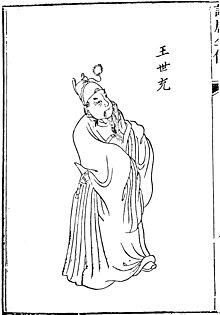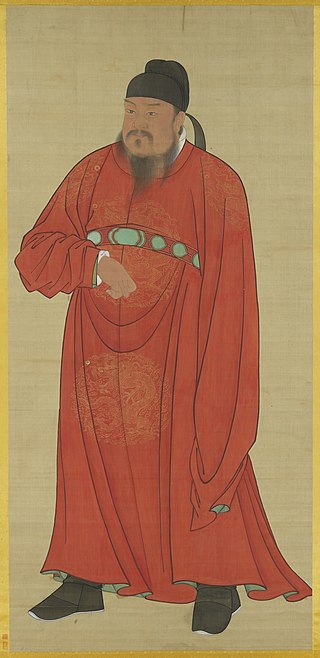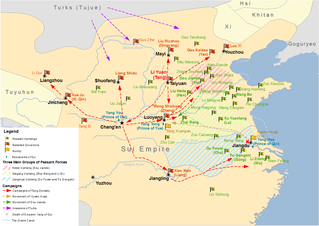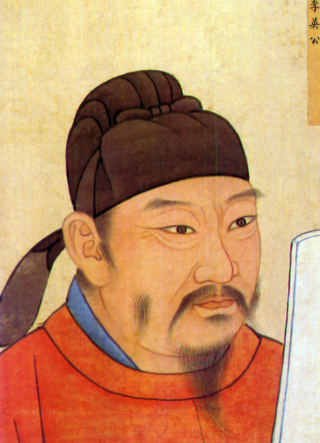This article needs additional citations for verification .(October 2021) |
| Wang Shichong | |||||||||
|---|---|---|---|---|---|---|---|---|---|
 | |||||||||
| Reign | May 25, 619 [1] [2] – June 4, 621 [3] [1] | ||||||||
| Born | 567 China | ||||||||
| Died | c.August 621 (aged 54) [3] China | ||||||||
| |||||||||
| Dynasty | Zhèng (鄭) | ||||||||
| Occupation | Military general, monarch, politician | ||||||||
- ↑ According to Wang's biographies in the Old Book of Tang [8] and New Book of Tang , [9] it was Yang Yichen who killed Ge; however, the Zizhi Tongjian [10] indicated that it was Wang who killed Ge.
Related Research Articles

Emperor Taizong of Tang, previously Prince of Qin, personal name Li Shimin, was the second emperor of the Tang dynasty of China, ruling from 626 to 649. He is traditionally regarded as a co-founder of the dynasty for his role in encouraging his father Li Yuan to rebel against the Sui dynasty at Jinyang in 617. Taizong subsequently played a pivotal role in defeating several of the dynasty's most dangerous opponents and solidifying its rule over China proper.

Emperor Gaozu of Tang, born Li Yuan, courtesy name Shude, was the founding emperor of the Tang dynasty of China, reigning from 618 to 626. Under the Sui dynasty, Li Yuan was the governor in the area of modern-day Shanxi, and was based in Taiyuan.
Feng Lun, courtesy name Deyi, better known as Feng Deyi, formally Duke Miao of Mi, was a Chinese official of the Sui and Tang dynasties who served as a chancellor during the reigns of Emperor Gaozu of Tang and Emperor Taizong of Tang. He was praised for his quick thinking but criticized by historians for his being overly attentive to the emperors' desires.

Qin Qiong, courtesy name Shubao, better known as Qin Shubao, was a Chinese general who lived in the early Tang dynasty of China. Along with Yuchi Gong, he continues to be worshipped in China as a door god. He is also known by his posthumous name Duke Zhuang of Hu.
Su Wei, courtesy name Wuwei (無畏), was a Chinese politician of the Chinese Sui dynasty. He first became an important official during the reign of Sui's founder Emperor Wen, and after Emperor Wen's death continued to serve Emperor Wen's son Emperor Yang. He was often praised for his abilities and integrity but criticized for pettiness. After Emperor Yang was assassinated in 618, he was nominally an official under Emperor Yang's nephew Yang Hao, and then under the warlords Yuwen Huaji, Li Mi, and Wang Shichong. After Wang Shichong's state of Zheng was destroyed by Tang dynasty in 621, neither the Tang general Li Shimin nor Li Shimin's father Emperor Gaozu of Tang was interested in retaining Su as an official, and Su Wei died soon thereafter.
Yang Tong, known in traditional histories by his princely title of Prince of Yue (越王) or by his era name as Lord Huangtai (皇泰主), also known by his posthumous name as the Emperor Gong of Sui (隋恭帝), courtesy name Renjin (仁謹), was an emperor of China's Sui dynasty. During the disturbances that permeated throughout the Sui state late in the dynasty's history, his grandfather Emperor Yang left him in charge of the eastern capital Luoyang, and after Emperor Yang was killed by the general Yuwen Huaji in 618, the Sui officials in Luoyang declared Yang Tong emperor. However, soon one of those officials, Wang Shichong, seized power, and in 619 had Yang Tong yield the throne to him, ending the Sui dynasty. Soon, he was killed on Wang's orders.

Dou Jiande was a Chinese rebel leader who led the agrarian rebels who rose against the rule of Emperor Yang of Sui near the end of the Chinese Sui dynasty. Generally considered the kindest and most able of the agrarian rebel leaders of the time, he was eventually able to capture the modern Hebei region and declare himself initially the Prince of Changle, and then the Prince of Xia. In 621, when the Tang dynasty general Li Shimin attacked Wang Shichong the Emperor of Zheng, who ruled the modern Henan region, Dou believed that if Tang were able to destroy Zheng, his own Xia state would suffer the same fate, and therefore went to Wang's aid, against the advice of his strategist Ling Jing (凌敬) and his wife Empress Cao. Li defeated him at the Battle of Hulao, capturing him. Li's father Emperor Gaozu of Tang subsequently put Dou to death. Xia territory was briefly seized by Tang, but soon Dou's general Liu Heita rose against Tang rule, recapturing Dou's territory, and held out against Tang until 623.
Empress Cao was the wife of Dou Jiande, an agrarian rebel leader who claimed the title of Prince of Xia at the end of the Chinese Sui dynasty.

Li Mi, courtesy name Xuansui (玄邃), pseudonym Liu Zhiyuan (劉智遠), was a Chinese military general, monarch, poet, politician, and rebel. He was the leader of a rebel movement against the rule of the Chinese Sui dynasty. He initially was the strategist of the Sui general Yang Xuangan, who rebelled against Emperor Yang of Sui in 613 but failed. In 617, Li subsequently led a rebellion against Emperor Yang in his own right and killed Zhai Rang, seizing Zhai's troops.

Yuwen Huaji was a Chinese military general, monarch, and politician of the Sui dynasty who, in 618, led a coup against and murdered Emperor Yang of Sui. He subsequently declared Emperor Yang's nephew Yang Hao emperor and led Emperor Yang's elite Xiaoguo Army (驍果) north. However, he was then repeatedly defeated by Li Mi, Li Shentong (李神通), and finally Dou Jiande. Believing that his defeat was near and wanting to become emperor before his ultimate defeat, he poisoned Yang Hao and declared himself the emperor of a Xu state. Dou captured him in 619 and killed him.
Liu Wuzhou was a rebel leader who rose against the rule of the Chinese Sui dynasty late in the dynasty's history, and he took imperial style—although it was not completely clear whether the title he took was khan or tianzi. He was initially only able to take control of modern northern Shanxi and parts of central Inner Mongolia, but after Li Yuan established the Tang dynasty at Chang'an as its Emperor Gaozu in 618, he, with support from Eastern Tujue, briefly captured Li Yuan's initial power base of Taiyuan in 619, posing a major threat to Li Yuan's rule. In 620, Li Yuan's son Li Shimin counterattacked, and not only recaptured Taiyuan but further captured Liu's power base Mayi, forcing Liu to flee to Eastern Tujue. When Liu subsequently tried to flee back to Mayi, Eastern Tujue executed him.

Zhu Can (朱粲) was an agrarian rebel leader during the disintegration of the Chinese Sui dynasty. He was particularly noted for his cruelty and his penchant for favoring cannibalism, and he, while not having a set base of operation, generally roved with his army in the modern southern Henan area, claiming for himself the title of Emperor of Chu. He also at times submitted to Li Mi the Duke of Wei, the Sui emperor Yang Tong, Emperor Gaozu of Tang, and Wang Shichong the Emperor of Zheng. After finally breaking with Tang, he fled to the Zheng capital Luoyang, and after Luoyang fell to Tang in 621, he was executed.
Xu Yuanlang (徐圓朗) was an agrarian rebel leader who rose against the rule of the Chinese Sui dynasty late in the reign of Emperor Yang of Sui. After doing so, he did not initially claim any royal title, instead successively submitting nominally to Li Mi the Duke of Wei, Emperor Yang's grandson Yang Tong, Dou Jiande the Prince of Xia, and the Tang dynasty. After Dou was defeated and killed by Tang in 621, Xu briefly re-submitted to Tang, but rose again later that year when Dou's general Liu Heita the Prince of Handong rose against Tang, allying himself with Liu. He claimed the title of Prince of Lu. Tang forces defeated both Liu and Xu in 622, and Xu was killed in flight in 623, ending Xu's state of Lu.

The transition from Sui to Tang (613–628), or simply the Sui-Tang transition, was the period of Chinese history between the end of the Sui dynasty and the start of the Tang dynasty. The Sui dynasty's territories were carved into a handful of short-lived states by its officials, generals, and agrarian rebel leaders. A process of elimination and annexation followed that ultimately culminated in the consolidation of the Tang dynasty by the former Sui general Li Yuan. Near the end of the Sui, Li Yuan installed the puppet child emperor Yang You. Li later executed Yang and proclaimed himself emperor of the new Tang dynasty.
Li Yuanji (李元吉), formally Prince La of Chao (巢剌王), more commonly known by the title of Prince of Qi (齊王), nickname Sanhu (三胡), was an imperial prince of the Chinese Tang dynasty. He was a son of the dynasty's founder Emperor Gaozu of Tang, and in the intense rivalry developed between his older brothers Li Jiancheng the Crown Prince and Li Shimin the Prince of Qin, he sided with Li Jiancheng and often advocated drastic actions against Li Shimin, including assassination. In 626, Li Shimin, fearing that Li Jiancheng and Li Yuanji were about to kill him, laid an ambush for them at Xuanwu Gate outside the palace and killed them. Li Shimin then effectively forced Emperor Gaozu to yield the throne to him.

Li Shiji, courtesy name Maogong, posthumously known as Duke Zhenwu of Ying, was a Chinese military general and politician who lived in the early Tang dynasty. His original family name was Xú, but he was later given the family name of the Tang imperial clan, Li, by Emperor Gaozu, the Tang dynasty's founding emperor. Later, during the reign of Emperor Gaozong, Li Shiji was known as Li Ji to avoid naming taboo because the personal name of Emperor Gaozong's predecessor, Emperor Taizong, had the same Chinese character "Shi". Li Shiji is also referred to as Xu Maogong and Xu Ji in the historical novels Shuo Tang and Sui Tang Yanyi.
Dou Kang, courtesy name Daosheng, was an official and general during the Sui and Tang dynasties who briefly served as a chancellor early in the reign of Emperor Gaozu of Tang.
Yuwen Shiji, courtesy name Renren, formally Duke Zong of Ying, was a Chinese statesman and politician of the Sui and Tang dynasties, serving as a chancellor, as Shizhong (侍中) (625–626) and Zhongshu Ling (中書令) (626–627), during the reigns of Emperors Gaozu and Taizong of Tang. He was previously an imperial prince in the short-lived state of Xu (許), which was ruled by his brother Yuwen Huaji.
Pei Ju, birth name Pei Shiju, courtesy name Hongda, formally Duke Jing of Anyi, was a Chinese cartographer, diplomat, politician, and writer who lived in the Sui and Tang dynasties, briefly serving as a chancellor during the reign of Emperor Gaozu of Tang. He was praised by traditional Chinese historians for his ability and lack of corruption, but blamed for flattering Emperor Yang of Sui and practically directly contributing to Sui's downfall by encouraging many external military campaigns that drained Sui's resources. Modern historians have questioned these assessments: Arthur F. Wright labelled the latter judgement in the Zizhi tongjian a "particularly blatant piece of editorializing" and "absurd ... beyond doubt."

Initiating Prosperity is a Chinese historical television series based on events in a period in Chinese history known as the Transition from the Sui dynasty to the Tang dynasty. The series was directed by Wang Wenjie and starred Shen Xiaohai, Liu Wenzhi, Zhang Zijian, Sun Feifei and Bao Guo'an. It was first broadcast on television stations in China in 2006.
References
Citations
- 1 2 3 Academia Sinica Chinese-Western Calendar Converter. Archived 2010-05-22 at the Wayback Machine
- 1 2 Zizhi Tongjian, vol. 187.
- 1 2 Zizhi Tongjian , vol. 189. Volume 189 of Zizhi Tongjian recorded that Wang Shichong's death took place between the dingmao and guiyou days of the 7th month of the 4th year of the Wude era of Li Yuan's reign. The dates correspond to 4 and 10 Aug 621 in the Julian calendar. In addition, the same volume also recorded that the decree to demote Wang Shichong to civilian status and to exile him to Sichuan along with his brothers, sons and nephews was issued on the bingyin day of the same month. (丙寅,诏赦世充为庶人,与兄弟子侄徙处蜀...) This corresponds to 3 Aug 621 in the Julian calendar.
- ↑ (或有驳难之者,充利口饰非,辞义锋起,众虽知其不可而莫能屈,称为明辩。) Sui Shu, vol.85
- ↑ Xiong (2006) , pp. 63–4.
- ↑ 大業十一年 八月癸酉 Academia Sinica Archived 2010-05-22 at the Wayback Machine (in Chinese)
- ↑ Sima Guang, Zizhi Tongjian, Vol. 182. (in Chinese)
- ↑ vol. 54 Archived 2007-10-11 at the Wayback Machine .
- ↑ vol. 85 Archived 2007-10-11 at the Wayback Machine .
- ↑ vol. 183
- ↑ (世充奸人,遭逢昏主,上则谀佞诡俗以取荣名,下则强辩饰非以制群论。终行篡逆,自恣陆梁,安忍杀人,矫情驭众,凡所委任,多是叛亡,出降秦王,不致显戮,其为幸也多矣。) Jiu Tang Shu, vol.54
General bibliography
- Xiong, Victor Cunrui (2006), Emperor Yang of the Sui Dynasty: His Life, Times, and Legacy, Albany: State University of New York Press, ISBN 9780791482681 .
| Wang Shichong | |||||||||||
|---|---|---|---|---|---|---|---|---|---|---|---|
| Chinese | 王世充 | ||||||||||
| |||||||||||